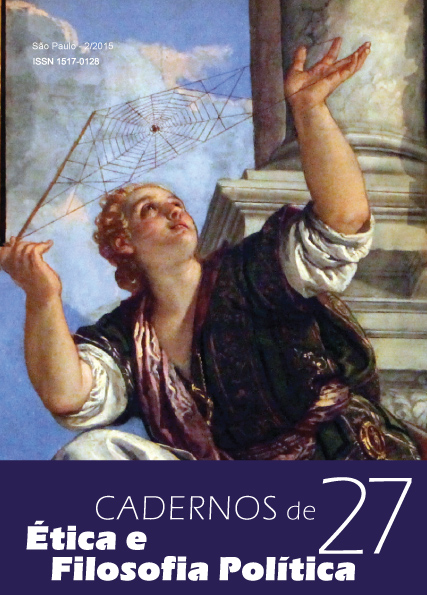Schopenhauer and the political theory of possessive individualism
DOI:
https://doi.org/10.11606/issn.1517-0128.v2i27p72-83Keywords:
Individualism, Natural right, Property, State, LiberalismAbstract
Schopenhauer's political theory part of nearby premises to Hobbes's theory: selfishness and competition lead to the need of the social contract to ensure safety in society. Although it is constantly compared to Hobbes in his description of human nature, Schopenhauer comes to diametrically opposite conclusions: affirm the existence of natural law beyond the social pact as well as the right to independent state ownership. The state, far from resemble the Hobbesian Leviathan, will have a very limited role: only the guarantee of law and security, without interfering much in the lives of individuals. Merging liberal and conservative elements, Schopenhauer's political theory is closer to Locke's theory than that put by the author of De Cive. I will try to develop this hypothesis in what follows.
Downloads
References
CARTWRIGHT, D. “Locke as Schopenhauer’s (Kantian) philosophical ancestor”. In: Schopenhauer Jahrbuch, nº 84, pp. 147-156, 2003.
CATTANEO, Mario. “Das Problem des Strafrechts im Denken Schopenhauers”. In: Schopenhauer Jahrbuch, nº. 67, pp. 95-112, 1986.
CATTANEO, Mario. “Schopenhauers Kritik der Kantischen Rechtslehre”. In: Schopenhauer Jahrbuch, nº 69, pp. 399-407, 1988.
GIACOIA Jr., Oswaldo. “A mentira e as luzes: aspectos da querela a respeito de um presumível direito de mentir”. In: Puente, Fernando Rey. Os filósofos e a mentira. Belo Horizonte: Editora UFMG, 2002.
KROON, Annette Godart-van der. “Schopenhauer’s Theory of Justice and its Implication to Natural Law”. In: Schopenhauer Jahrbuch, nº 84, pp. 121-145, 2003.
HAMLYN, D.W. “Eternal Justice”. In: Schopenhauer Jahrbuch, nº 69, pp. 281-288, 1988.
HORKHEIMER, Max. “Schopenhauer und die Gesellschaft”. In: Schopenhauer Jahrbuch, no 36, Frankurt am Main, pp. 49-57, 1955.
HORKHEIMER, Max. “Die Aktualität Schopenhauers”. In: Schopenhauer Jahrbuch, no 42, Frankurt am Main, pp. 12-25, 1961.
HOBBES, T. Leviatã ou matéria, forma e poder de um estado eclesiástico e civil. Coleção “Os Pensadores”. São Paulo: Abril Cultural, 1983.
KÜPPER, Georg. “Der Begriff des Unrechts bei Schopenhauer”. In: Schopenhauer Jahrbuch, nº 74, pp. 103-114, 1993.
LOCKE, J. Dois tratados sobre o governo. Laslett (ed.). São Paulo: Martins Fontes, 1998.
LUKÁCS, G. El Asalto a la Razón. Trad. de Wenceslao Roces. Barcelona, Grijalbo, 1976.
MACPHERSON, C.B. The Political Theory of Possessive Individualism. Oxford: Clarendon Press, 1962.
MÜNKLER, H. “Ein janusköpfiger Konservatismus: Arthur Schopenhauers politische Ideen”. In: Spierling, V. (org). Schopenhauer im Denken der Gegenwart. Munique: Piper, pp. 217-237, 1987.
NIETZSCHE, F. Obras incompletas. Coleção “Os Pensadores”. 3ª ed. São Paulo: Abril Cultural, 1983.
SCHOPENHAUER, Arthur. Sämtliche Werke. Editadas e comentadas criticamente por Arthur Hübscher. Wiesbaden: F. A. Brockhaus, 7 vols, 1972.
SCHOPENHAUER, Arthur. Crítica da filosofia kantiana. Tradução de Maria Lúcia Cacciola. Coleção “Os Pensadores”. 2ª ed. São Paulo: Abril Cultural, 1980.
SCHOPENHAUER, Arthur. Parerga und Paralipomena. Zurique: Haffmans, 2 vols, 1988.
SCHOPENHAUER, Arthur. Sobre o fundamento da moral. Tradução de Maria Lúcia Cacciola. São Paulo: Martins Fontes, 1995.
SCHOPENHAUER, Arthur. O mundo como vontade e como representação. Tradução de Jair Barboza. São Paulo: Unesp, 2005.
SCHOPENHAUER, Arthur. Sobre a ética. (Capítulos 8 – 15 de Parerga e Paralipomena de Arthur Schopenhauer). Organização e tradução de Flamarion C. Ramos. São Paulo: Hedra, 2012.
Downloads
Published
Issue
Section
License
Copyright (c) 2015 Flamarion Caldeira Ramos

This work is licensed under a Creative Commons Attribution-ShareAlike 4.0 International License.


